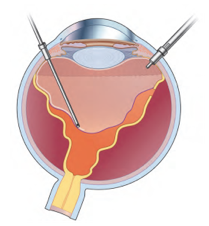Vitrectomy Singapore
A vitrectomy is a microsurgical procedure done by a Vitreo-Retinal surgeon for a variety of different conditions. These conditions include retinal detachments, advanced diabetic eye disease, epiretinal membranes, macular holes, complicated cataracts, etc. It is done in an operating theatre under local or general anesthesia. Under local anaesthesia, you will be awake but comfortably sedated whereas under general anaesthesia, you will be completely unconscious. You may choose to go home after the procedure or you may opt for a short stay in the hospital.
How a vitrectomy is done
Very tiny incisions are made in the sclera (the white of the eye) and microsurgical instruments are then inserted into the eye through these incisions. The sticky vitreous gel is then carefully teased off the delicate retinal surface and cleared away. The vitreous gel is not needed for normal functioning of the eye, and will eventually be replaced by fluids produced naturally by the eye.

Microsurgical instruments are inserted into the eye through very small incisions
which may require no stitching after surgery. The sutureless vitrectomy
technique leads to less discomfort after surgery and faster recovery.
After the vitreous gel has been safely removed, membrane peeling, laser, cryotherapy (freezing), or re-attachment of retina can then be done.
The eye may be filled with salt solution, air, synthetic gas, or medical grade silicone oil at the end of surgery at the end of surgery. Gases will gradually by replaced by fluid produced naturally by the eye over a few weeks to 2 months but silicone oil will need to be removed a few months later.
Recovery after surgery may take a few weeks. However, recovery with the new small incision sutureless vitrectomy microsurgical technique is now faster than before since smaller incisions cause little postoperative discomfort and heal quickly. The success rate of vitrectomy is very high if the condition being dealt with is diagnosed and treated early by an eye specialist.
Book an appointment for a vitrectomy with our experienced eye surgeon.
FAQs about Vitrectomy
I have been asked to maintain a specific head position after surgery. How important is it for me to comply?
After vitrectomy for certain conditions like macular diseases and retinal detachments, the eye may be filled with gas or silicone oil. Adopting a specific head position will help to increase the success rate of surgery. Not complying with head positioning may lead to complications such as severe cataract formation, lens implant mal-positioning and failure of surgery, etc.
You may be asked to position face down, or with one of your cheeks on a pillow. The exact head position to adopt and for how long will differ according to the condition being treated. Your surgeon will be able to confirm the best position for you after the surgery.
I was told to avoid air travel after a vitrectomy. How important is it for me to comply?
If your eye has been filled with gas after vitrectomy, you must avoid air travel until the gas has disappeared. This is because high altitude will cause the gas bubble to expand and eye pressure can become dangerously high, leading to irreversible blindness. You should check with your eye surgeon when it is safe again for you to fly.
Eyes that are filled with salt solution or silicone oil after surgery can safely travel by air.
